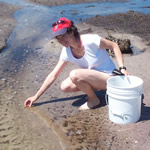OSEI II - Diversity of Life
—by Catherine Cramer, Staff Writer
 A recent challenge for the Boston Public Schools (BPS) has been the need to replace the land snail in the FOSS Diversity of Life (DOL) 7th grade curriculum. An entire unit utilized the land snail, which has become increasingly difficult – if not impossible – to obtain; there has been a nationwide ban on shipping the land snail since it was classified as an agricultural pest in many states. The OSEI II project leaders, working with the BPS Science Department, concluded that finding one or more marine organisms to substitute for the land snail would be an appropriate focus for OSEI II.
A recent challenge for the Boston Public Schools (BPS) has been the need to replace the land snail in the FOSS Diversity of Life (DOL) 7th grade curriculum. An entire unit utilized the land snail, which has become increasingly difficult – if not impossible – to obtain; there has been a nationwide ban on shipping the land snail since it was classified as an agricultural pest in many states. The OSEI II project leaders, working with the BPS Science Department, concluded that finding one or more marine organisms to substitute for the land snail would be an appropriate focus for OSEI II.
The OSEI II DOL Team met in May to begin preliminary planning, led by facilitators Sukey Padawer and Joel Rubin of the New England Aquarium. Two potential replacements for the land snail – the mudsnail and zooplankton – were chosen to be investigated. Researchers Jacqui Steinback of the University of Rhode Island and Dr. Juanita-Urban Rich of UMass Boston were designated to begin background research.
In June a five-day BPS DOL professional development training workshop was led by OSEI team members Phil Manna and Deborah Mylott McKennon. Twenty teachers participated, experimenting with both periwinkles and mud snails. The mud snail seemed the best candidate to explore further. ``Teachers nationwide were less than happy when the land snail disappeared,’’ said Sukey. ``They liked it because it was easy to transport and keep, and responsive so students liked it. But the mud snail is very engaging, and a good match for the middle school learner.’’
The OSEI DOL team then met for two days in August to investigate best ways to integrate the mud snail and zooplankton into the DOL FOSS kit. Bill Andrake, middle school science specialist from Swampscott and a Massachusetts Marine Educator, shared his expertise on maintaining live marine organisms in the classroom. The team experimented with using FOSS protocols, brainstorming best ways to integrate organisms into existing DOL investigations. They developed an action plan for the fall to design written materials and lab instructions to support modified investigations; work with curriculum developers; and troubleshoot materials distribution, including care and transport of the organisms. ``We’re really modeling the scientific process of investigation in developing this curriculum,’’ said Sukey Padawer.
``We’ve had great input from the scientists who are developing the curriculum pieces,’’ said Sukey. Jacqui Steinbeck supplied much of the content supporting the use of the mud snail, including anatomy, diet, reproduction, care and feeding. Dr. Urban-Rich developed a plankton identification guide, instructions for plankton care and feeding, and written content on “Drifters of the Sea”. ``The researchers insured success with teachers,’’ said Sukey. ``They created a framework for teachers to see our objectives and got teachers interested and creatively involved.’’
The amount of excitement and participation has gotten things to move quickly. ``It’s happening faster than we thought it would,’’ said Sukey. ``We’re field testing with two of the four participating teachers right now (mid-November). There are already lots of outcomes: the `Meet the Land Snail’ reading has been rewritten by Phil Manna; mud snail internal and external anatomy illustrations have been developed; and we have designed a series of mud snail observation and preference investigations as well as zooplankton observation activities that have already been successfully implemented in the classroom.’’
Replacing the land snail with marine organisms would ensure that ocean science will become a sustainable part of the middle school science curriculum. NE-COSEE will supply mud snails and zooplankton to trial classrooms this year, with the intent of pilot testing across a wider range of BPS 7th grade classrooms in 2005-2006.
BPS teachers participating in DOL curriculum development and field testing are: Phil Manna (Edison MS); Jody Gould Calabro (Grover Cleveland MS); Robert Cho (Timilty MS); and Jeanne McCabe (Edwards MS).